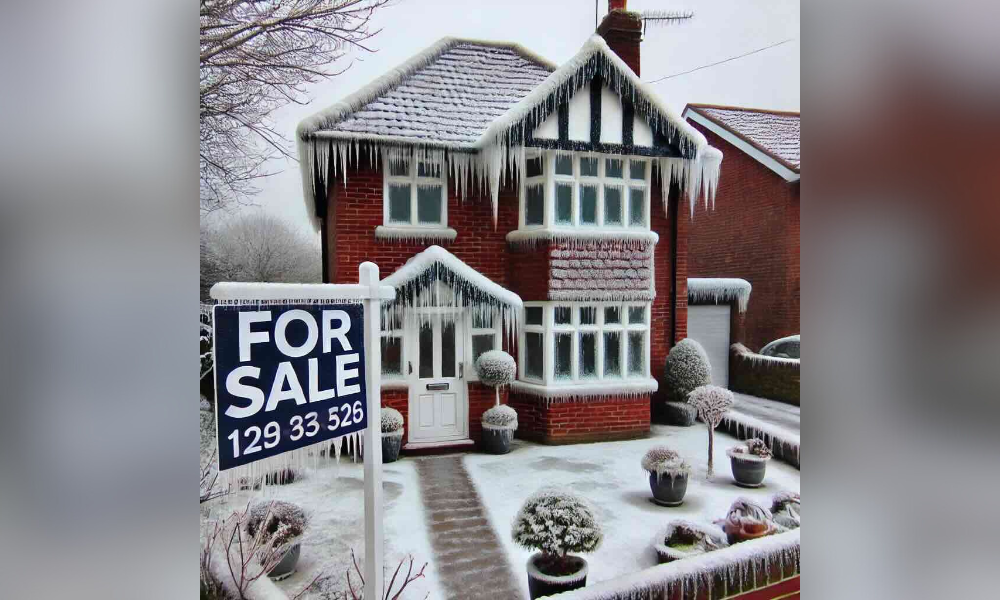Agents have more property for sale than they have had for a decade – but there's also good news

As we reported last week, fears are rising that the property bounce we were seeing may be coming back to earth. A jump in house prices appears to have almost come to a standstill as new figures have been released to show property price momentum has all but run into a wall.
A new report has revealed that the UK property market has experienced slower-than-expected price growth, with both buyers and sellers exercising caution as the Chancellor’s upcoming budget looms large. The Rightmove report shows that asking prices for homes across the country rose by just 0.3%, still a rise, but falling far short of the typical 1.3% increase usually seen in this busy month for real estate, according to the data from Rightmove. The average asking price of a home now stands at £371,958.
The slowdown in price growth coincides with an increase in the number of properties hitting the market, providing buyers with more options than in recent years. Rightmove reported that the number of homes available for sale was 12% higher than the same period last year, marking the highest level per estate agent since 2014. This oversupply is giving buyers more negotiating power and contributing to the modest price rise.
“Buyer choice has soared to levels not seen in a decade,” said Tim Bannister, Rightmove’s director of property science. “With such a large crop of properties to choose from, sellers need to price their homes competitively to attract buyers.” Bannister also pointed out that the market remains strong despite the affordability challenges many movers face. He noted that “some estate agents report that movers are also now waiting for Budget clarity and anticipated cheaper mortgage rates later this year.”
Read more: Selling 'frenzy' as property investors try to avoid Labour tax grab
The Budget, set to be delivered by Chancellor Rachel Reeves on October 30, is a key factor influencing the cautious behaviour of buyers and sellers. Many are holding off on decisions until more is known about potential tax changes. “Concerns over what the Budget may hold have made buyers more cautious,” said Lucian Cook, head of residential research at Savills. There is widespread speculation that Labour’s policies could introduce further uncertainty for the property market.
Despite this, the long-term outlook remains positive. Bannister has suggested that market optimism could surge again once the budget is out and if the Bank of England continues to lower interest rates, following the rate cuts seen earlier this year. “Once we have more certainty about the contents of the Budget, hopefully followed by speedy second and third Bank Rate cuts, we could see another surge in market optimism like we had in the summer,” he said.
Interestingly, while price growth has slowed, sales activity has not – and that’s great news for those of us in the mortgage industry. The number of homes sold has risen by nearly a third compared to the same period last year, with a 29% increase in sales agreed and 17% more house hunters contacting estate agents. Bannister highlighted that “sales activity has not only bounced back from the low of last year but has continued an upward trajectory.” This suggests that, despite some market uncertainty, demand for homes remains healthy, with many people planning their next move.
Additional data from online portal Zoopla supports this view, indicating that homeowners in the UK who bought property in the last 20 years have seen significant value gains. On average, these homeowners are sitting on £80,000 in gains, and those who sold their homes in the past 12 months have made an average profit of £65,000, despite the recent slowdown in house price growth.
Competition among sellers is particularly intense, especially at the higher end of the market. There has been a notable increase in the number of larger, detached homes with four or more bedrooms entering the market. Rightmove emphasized that in such a competitive market, sellers must set realistic prices to attract buyers.
When the pandemic hit, perversely driving a property boom, estate agents were scrambling for properties – and were lucky to have 40 listings – now the average agent has 63. The good news behind all of this is that apart from landlords bailing, the influx of properties being listed is a great sign that all those sellers are now potential buyers, confident enough to list.



